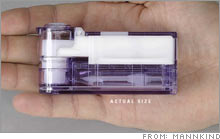Mannkind: The next great hope for diabetics?Can a relatively small outfit with a funny name succeed in an arena where giants like Pfizer have floundered?NEW YORK (CNNMoney.com) -- Diabetes is sweeping through America like a wildfire, afflicting nearly 21 million Americans and fueling an estimated $20 billion industry for treatment. That's an average of nearly $1,000 in annual healthcare costs for each diabetic. But for drug companies, the money isn't necessarily easy to come by, even when they're selling a new technology like inhaled insulin.
Inhaled insulin is intended to be more convenient than injected insulin, an 80-year-old technology. But getting the new technology on the market has been tough. Pfizer (down $0.04 to $25.93, Charts), the biggest drug company in the world, and its partner Nektar Therapeutics (down $0.09 to $15.12, Charts) were the first to release inhalable insulin into the market in January of this year, with a device called Exubera. Analysts had hailed Exubera as a potential billion-dollar blockbuster. But its sales have been so low that the New York-based Pfizer hasn't bothered to report them. Pfizer says sales have been slow because physicians have to be trained to use the device, but that it plans to ramp up its roll-out in January, but the impact of that remains to be seen. Now a company called Mannkind (Charts) is trying to get its own inhalable insulin product, called Technosphere, onto the market. Although the company doesn't expect to have anything on the market before 2009, shares of the Valencia, Calif.-based outfit have shot up by a third year-to-date. Mannkind's stock has continued to climb even after the company's Dec. 12 offering of 20 million shares. (Chief executive Alfred Mann bought $100 million worth, or about one-fourth of that total.) Jefferies & Co. analyst Salveen Kochnover compares the runup to those experienced by biotechs. "You're buying [the shares] for future revenue," she said. Mannkind's Technosphere device is supposed the be next generation model for inhalable insulin. It's the size of a cell phone and fits in the palm of the hand, compared to Exubera, which is the size of a fat flashlight. (Pfizer is also developing a next-generation device.) Other companies are also developing inhalable insulin devices, but Daniel Poso, analyst for Datamonitor, reserves his most bullish projections for Technosphere. He projects Technosphere sales will reach $288 million by 2015, followed by $276 million for the AIR device from Alkermes (Charts) and Eli Lilly (Charts), $207 million for Exubera and $177 million for AERx from Novo Nordisk (down $0.06 to $84.29, Charts) and Aradigm (Charts). Mannkind's experimental device delivers insulin faster that Exubera and, depending on who you talk to, might be less cumbersome to use. Because Exubera has a retractable transparent tube that fills with white powder, analysts and diabetics sometimes compare it to a bong. Mannkind chief financial officer Dick Anderson said his device delivers the insulin so quickly that it "mimics what you see in a healthy individual" who is not diabetic. But Mannkind is facing plenty of challenges. Kochnover, the analyst for Jeffries, said that Mannkind won't get Technosphere on the market before 2009. Also, she said the company lacks any planned, stock-moving milestones for 2007 and that "they're burning a lot of cash." For instance, the company needs a partner to market Technosphere, said Mannkind's chief financial officer Dick Anderson. "Our core strategy is to pursue a partnership with a large pharmaceutical company, looking for assistance with sales and marketing," said Anderson. The CFO wouldn't identify any potential takers, except to say "they need a large sales force." But potential partners seem to be sitting on the sidelines, waiting to see if Exubera can get off the ground, according to a report from W.R. Hambrecht analyst Andrew Forman. If it does, both Pfizer and competitors like Mannkind will all likely breathe a sigh of relief. |
|

